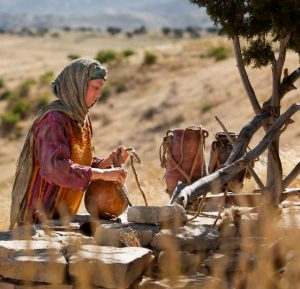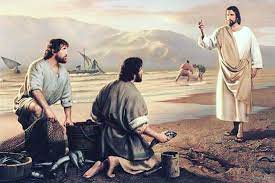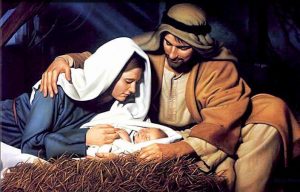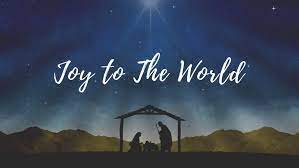
Sermon
Bible Readings
Genesis 18:1-15
The Lord appeared to Abraham at the sacred trees of Mamre. As Abraham was sitting at the entrance of his tent during the hottest part of the day, he looked up and saw three men standing there. As soon as he saw them, he ran out to meet them. Bowing down with his face touching the ground, he said, “Sirs, please do not pass by my home without stopping; I am here to serve you. Let me bring some water for you to wash your feet; you can rest here beneath this tree, I will also bring a bit of food; it will give you strength to continue your journey. You have honoured me by coming to my home, so let me serve you.”
They replied, “Thank you; we accept.”
Abraham hurried into the tent and said to Sarah, “Quick, take a sack of your best flour, and bake some bread.” Then he ran to the herd and picked out a calf that was tender and fat, and gave it to a servant, who hurried to get it ready. He took some cream, some milk, and the meat, and set the food before the men. There under the tree he served them himself, and they ate.
Then they asked him, “Where is your wife Sarah?”
“She is there in the tent.” he answered.
One of them said, “Nine months from now I will come back, and your wife Sarah will have a son.”
Sarah was behind him, at the door of the tent, listening. Abraham and Sarah were very old, and Sarah had stopped having her monthly periods. So Sarah laughed to herself and said, “Now that I am old and worn out, can I still enjoy sex? And besides, my husband is old too.”
Then the Lord asked Abraham, “Why did Sarah laugh and say, ‘Can I really have a child when I am old?’ Is anything too hard for the Lord? As I said, nine months from now I will return, and Sarah will have a son.”
Because Sarah was afraid, she denied it. “I didn’t laugh,” she said.
“Yes you did,” he replied. “You laughed.”
Psalm 116:1–2, 12–19 (paraphrase)
I love you, God, because you listen to my prayers every single time I call out to you.
What can I ever offer you for all you have done for me? I know: I’ll bring an offering of wine to thank you for saving me. I’ll bring it into the assembly of the people, so everyone can see that I appreciate what you have done.
How painful it must be for you, God, when one of your people dies.
But you have saved me from death. I will serve you just as my mother served you. I will give you my sacrifice of thanksgiving and offer you my prayers and praise. In front of all the people, in the midst of the Jerusalem temple, I will give you all I have promised, for you have been so good to me.
With all my being, I offer you my praise!
Romans 5:1-8
(divide congregation into four groups)
Therefore, since we have been justified through faith, we have peace with God through our Lord Jesus Christ, through whom we have gained access by faith into this grace in which we now stand.
All: And we boast in the hope of the glory of God.
Not only so, but we also glory in our sufferings, because we know that –
Group One: Suffering produces endurance.
Group Two: Endurance produces character.
Group Three: Character produces hope.
Group Four: Hope does not disappoint us.
All: because God’s love has been poured out into our hearts through the Holy Spirit, who has been given to us.
You see, at just the right time, when we were still powerless, Christ died for the ungodly. Very rarely will anyone die for a righteous person, though for a good person someone might possibly dare to die.
But God’s great love is demonstrated in this:
All: While we were still sinners, Christ died for us.
Matthew 9:35-10:10
Jesus went around visiting all the towns and villages. He taught in the synagogues, preached the Good News about the Kingdom, and healed people with every kind of disease and sickness. As he saw the crowds, his heart was filled with pity for them, because they were without a shepherd. So he said to his disciples, “The harvest is large, but there are few workers to gather it in. Pray to the owner of the harvest that he will send out workers to gather in his harvest.”
Jesus called his twelve disciples together and gave them authority to drive out evil spirits and to heal every disease and every sickness. These are the names of the twelve apostles; first Simon (called Peter) and his brother Andrew; James and his brother John, the sons of Zebedee; Philip and Bartholomew; Thomas and Matthew, the tax collector; James son of Alphaeus, and Thaddeus; Simon the Patriot, and Judas Iscariot, who betrayed Jesus.
These twelve men were sent out by Jesus with the following instructions; “Do not go to any Gentile territory or any Samaritan towns. Instead, you are to go to those lost sheep, the people of Israel. Go and preach, ‘The kingdom of heaven is near!’ Heal the sick, bring the dead back to life, heal those who suffer from dreaded skin diseases, and drive out demons. You have received without paying, so give without being paid. Do not carry any gold, silver, or copper money in your pockets; do not carry a beggar’s bag for the journey or a spare shirt or shoes or a walking stick. Workers should be given what they need.
Sermon ‘Compassion’
The Mathew reading tells us – “Jesus went around visiting all the towns and villages. He taught in the synagogues, preached the Good News about the Kingdom, and healed people with every kind of disease and sickness. As he saw the crowds, his heart was filled with pity for them, because they were without a shepherd.”
The phrase “his heart was filled with pity (or compassion) for them” can also be translated from the Greek as “his guts were twisted in pain by his compassion for them.” While a bit rougher than the first I like thus version as it saves us from some of the baggage the word ‘pity’ holds and emphasises how deeply moved Jesus was by the plight of the people around him.
And notice two things; Jesus is concerned not just about people believing his good news but in their physical and mental well-being. And secondly he immediately does something about it. After commenting that there are few workers for the harvest he doesn’t despair and say it’s all too hard. He looks at what he has and organises the twelve men he has to add to what he is doing.
In the Genesis reading which we only referred to today, we also meet a compassionate God. In this story we hear about Sarah’s infertility. She believes it is now impossible for her to have children, as both she and Abraham are just too old. But God has different ideas. And he promises a child, in fact a son, something that would wipe away all the years of shame at not producing an heir for Abraham. Finally. And Sarah laughs in disbelief.
And here we have the worm in the apple, especially on this day that has been designated Disability Sunday. Why does a compassionate God not cure every disease and sickness? Why does he let bad things happen to good people, or even just okay people, or to totally innocent children? Why?
Honestly I’m not sure if there is a simple answer. But what I do know is that often disability is not the problem, it is the way we use labels to categorise people. And that is ridiculous when you think about it because all of us are disabled in some way. Because really ‘disabled’ means ‘not able to do (something)’. And that is true for all of us. I am unable to sail an America’s Cup boat. I am unable to understand, build and launch a rocket. I am unable to keep most plants alive. I suspect you too may be able to come up with a list too. And yet the fact that I am unable to do lots of things results in me being rarely called ‘disabled’.
No, we tend to keep that label for the disabilities that are easy to see. And yet even then we are selective. I obviously wear glasses. Without them I am unable to see this sermon, your faces and probably how to get out of the building. Without my glasses I would be in truth be disabled, unable to cope in this modern world.
And that is often the criteria. You have a disability if you don’t fit in, if you face barriers when you try to live your life. Now when you use that as your disability criteria; that there are barriers to living life as you wish it – all of us are disabled. Some are unable to do what they want to do because of the colour of their skin. Some face barriers because of their gender. Some are unable to be who they could be because their brain does not work like other people’s and they are labelled strange or difficult or mad. Still others have physical characteristics that don’t fit the ‘norm’ (whatever that is) and so they struggle to go places or to do what is expected. And the list goes on. Continue reading Sunday 18th June – Disability Sun Compassion →










